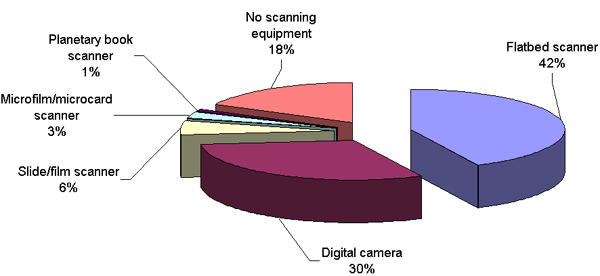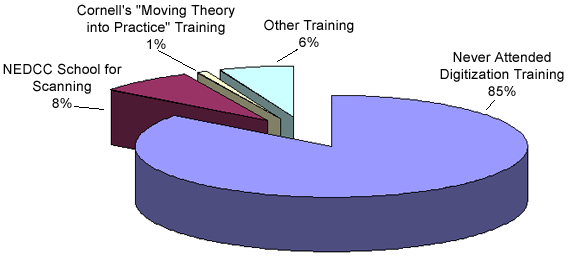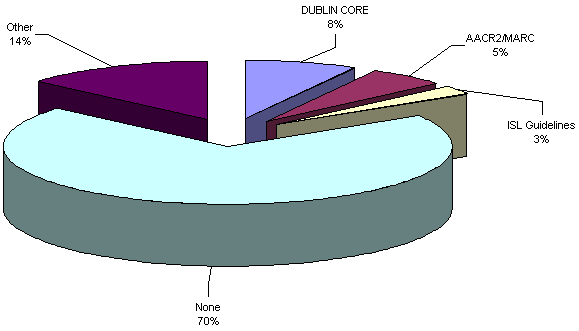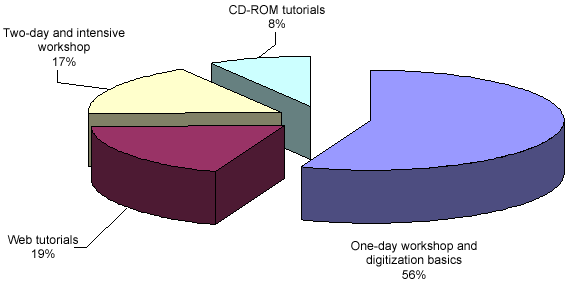
"We
don't know the first thing about digitization:"
Assessing the Need for Digitization Training in Illinois
Trevor Jones
Illinois Digitization Institute,
University Library,
University of Illinois at Urbana-Champaign
trevorj@staff.uiuc.edu
Beth
Sandore
University
Library,
University of Illinois at Urbana-Champaign
sandore@uiuc.edu
Ask
non-specialists what it takes to complete a digital imaging project, and
responses will range from a desire to "slap it on a scanner and go"
to uncomprehending glassy-eyed stares. The reality lies somewhere between
these two extremes, but it is apparent that many cultural heritage professionals
are confused by the digitization process. Most are interested in digitizing
some part of their collections, but often possess only a vague idea of
how to begin. Although great advances have been made in the development
of standards and best practices for digitization, these principles have
yet to filter down to the majority of non-specialists. In Illinois, as
in many states, there is such pressure to "get materials on the Web"
that digitization projects are often hastily planned and poorly executed.
In January 2001, the Illinois
Digitization Institute was created to develop digitization training
materials for cultural heritage organizations throughout the state. The
Institute is part of the Digital Imaging and Media Technology Initiative
at the University Library at the University of Illinois at Urbana-Champaign.
Funded by a Library Services and Technology Act grant administered by
the Illinois State Library, the Institute's first priority was to determine
the extent and type of digitization training needed in the state. One
of the primary goals of the Institute was to develop training to provide
cultural heritage professionals with the means to mainstream digitization
into their institutions' activities. We were interested in developing
a model that differed from the nationally acclaimed workshops offered
by the Cornell University Library and the Northeast Document Conservation
Center (NEDCC), by providing both training opportunities and continuing
advice. The success of national and regional digitization workshops offered
by groups such as Cornell and the NEDCC made it clear that cultural heritage
institutions have a strong need for digitization training. Although there
is anecdotal information about training activities and needs throughout
the country, we found no examples of systematic assessment of digitization
training programs. Since we were working with a geographically defined
population, we felt it would be useful to gather information about Illinois
institutions' prior training, their perceived needs, and their digitization
activities to date.
In order to meet this objective, the Institute sent out surveys to 459
libraries, museums, and archives throughout Illinois. We surveyed institutions
of all sizes, ranging from large academic libraries to all-volunteer historical
museums. The survey hoped to determine:
- The extent to which digitization training is needed
- The types of training formats that are most desired
- The types of digital projects currently under way
- The extent to which current digital projects follow best practices
- The amount and type of digitization equipment at cultural heritage institutions in the state.
We sent the survey to a random stratified sample of public, academic, and school libraries, as well as "special" cultural heritage institutions, including museums, historical societies, and archives. The overall response rate for the survey was 32%, and the results were tabulated by the Survey Research Laboratory at the University of Illinois at Chicago. Forty-seven percent of responses were from public libraries, 30% from schools, 5.6% from academic libraries, 4.2% from library systems, and 11.8% from museums and archives. Not surprisingly, the responses indicated a substantial need for digitization training in Illinois. Although the survey was limited to one state, it is probable that similar surveys conducted elsewhere would produce comparable results.
One of the survey's most surprising findings was the percentage of institutions that already own some type of digitization equipment. Eighty-two percent of all respondents reported owning a flatbed scanner, digital camera, or some other digitization tool (See figure 1).

Figure 1: Types of Digital Equipment Owned by Survey Respondents
However, relatively few institutions had the knowledge required to effectively
digitize cultural heritage collections. Only 15% of respondents reported
that they or other staff members at their institution had attended digitization
workshops or in-depth training sessions like those hosted by the Northeast
Document Conservation Center or Cornell University Library (See figure
2).

Figure 2: Digitization Training Attended by Survey Respondents
Despite the prevalence of digitization equipment in the state, comparatively
few institutions had begun to digitize their collections at the time of
the survey. Although 82% of respondents owned digitization tools, only
35% had conducted digital projects and overall the results of these projects
had been discouraging. Only fifty-one percent of reported digital projects
were available on the Web, while 28% of completed digital projects had
not yet begun to provide any public access. More than two-thirds of the
digital projects reported on in the survey did not utilize any type of
metadata, and only eight percent had made use of the common Dublin Core
metadata element set (See figure 3).

Figure 3: Types of Metadata used by Survey Respondents
If the trends identified in this survey continue, the vast majority of
digital projects in Illinois will fail to meet even basic standards for
Internet access to digital materials. Unless more training is provided,
cultural heritage institutions will continue to underutilize their equipment
and produce substandard digital content. This failure could have long-term
consequences for the state's cultural heritage institutions. The lack
of robust metadata in the majority of the state's digital projects will
make it difficult if not impossible to share data, and will certainly
result in increased labor and material costs in the future.

We found that cultural heritage institutions are somewhat receptive to
learning more about the theory and practice of digitization. Over half
of the respondents expressed interest in one-day workshops on digitization
basics (56%), followed by Web-based tutorials (19%) (See figure 4).

Figure 4:Types of Digitization Training Favored by Survey Respondents
However, only 17% were interested in workshops longer than one day, and
although many expressed a desire to learn about "Digital Capture"
and "Materials Selection," the majority was indifferent to the
drier subjects of "Metadata" and "Project Planning."
These answers suggest that many respondents are primarily seeking an introduction
to digitization, and lack knowledge of the importance of project planning
in the digitization process. A cross-tabulation of the survey results
indicates that cultural heritage professionals are not fully aware of
the prerequisites for successfully completing a digitization project.
While only 17% percent of all respondents expressed interest in multi-day
training sessions, those who had already received formal digitization
training were more than twice as likely (50%) to express an interest in
multi-day workshops. This disparity suggests that individuals who have
received at least some digitization training understand the complexities
of the process and realize that it takes more than a day to learn how
to successfully implement a digitization program.
The Illinois Digitization Institute is using the results of the survey
to design training materials for cultural heritage organizations in Illinois.
Because the survey indicated that novices would most likely attend one-day
training sessions, we began offering a series of free one-day workshops
covering the basics of digitization. Limited to 15 participants, these
sessions focus on project planning, choosing equipment, and also provide
hands-on opportunities to work with a flatbed scanner and digital camera.
The aim of these introductory sessions is not to convince cultural heritage
organizations to embark on digitization projects, but rather to help them
make informed choices about digitization and its role in their institutions.
If participants decide to proceed with a digital project, they are encouraged
to do additional readings or enroll in the Institute's series of interactive
Web-based course modules. Using WebCT and WebBoard, these two-week modules
make use of discussion boards and collaborative assignments to help participants
plan and develop their own digitization program.
The Institute has also developed online training for recipients of digitization
grants funded by the Illinois State Library. Recipients of LSTA Educate
and Automate digitization grants are now required to complete a digitization
course before receiving their grant funds. For this training, the institute
has adopted a slightly different approach. Because participation in this
training is mandatory, training begins with a two-week online course module
covering the basics of digitization. Students are asked to do readings,
answer questions online, participate in WebBoard discussions, and prepare
a formal evaluation of another institution's digitization project. The
follow-up to this online training is a two-day hands-on intensive workshop
held at the University of Illinois at Urbana-Champaign. Because project
planning and evaluation have been covered in the online course, more workshop
time is available to address the practical aspects of scanning, image
manipulation, and problems specific to the grantees' own digital projects.
Although there was some grumbling from the grant recipients about the
time commitment required for the training, evaluations have been almost
uniformly positive. Participants in all of the Institute's training leave
with a detailed digitization bibliography, links to a technical insert
providing an overview of the digitization process, and access to an Image
Quality Calculator program that assists in determining optimal resolution
for scanning text documents. As we continue to assess the efficacy of
these training methods, the Institute is hopeful that these efforts will
eliminate some of the confusion surrounding digitization, and thus "raise
the bar" for digital projects throughout Illinois.
Acknowledgements: The Illinois Digitization Institute has been developed
pursuant to a Library Services and Technology Act grant administered by
the Illinois State Library. The authors would like to thank Anne Craig,
Joe Natale, Connie Frankenfeld, and Alyce Scott from the Illinois State
Library for their assistance.
![]()
Publishing
Information
RLG DigiNews
(ISSN 1093-5371) is a newsletter conceived by the members of the Research
Libraries Group's PRESERV community. Funded in part by the Council on
Library and Information Resources (CLIR) 1998-2000, it is available internationally
via the RLG PRESERV
Web site (http://www.rlg.org/preserv/). It will be published six times
in 2001. Materials contained in RLG DigiNews are subject to copyright
and other proprietary rights. Permission is hereby given for the material
in RLG DigiNews to be used for research purposes or private study.
RLG asks that you observe the following conditions: Please cite the individual
author and RLG DigiNews (please cite URL of the article) when using
the material; please contact Jennifer
Hartzell, RLG Corporate Communications, when citing RLG DigiNews.
Any use other than for research or private study of these materials requires
prior written authorization from RLG, Inc. and/or the author of the article.
RLG DigiNews is produced for the Research Libraries Group, Inc. (RLG)
by the staff of the Department of Preservation and Conservation, Cornell
University Library. Co-Editors, Anne R. Kenney and Nancy Y. McGovern;
Production Editor, Barbara Berger Eden; Associate Editor, Robin Dale (RLG);
Technical Researchers, Richard Entlich and Peter Botticelli; Technical
Coordinator, Carla DeMello.
All links in this issue were confirmed accurate as of February 14, 2002.
Please send your comments and questions to preservation@cornell.edu.
![]()